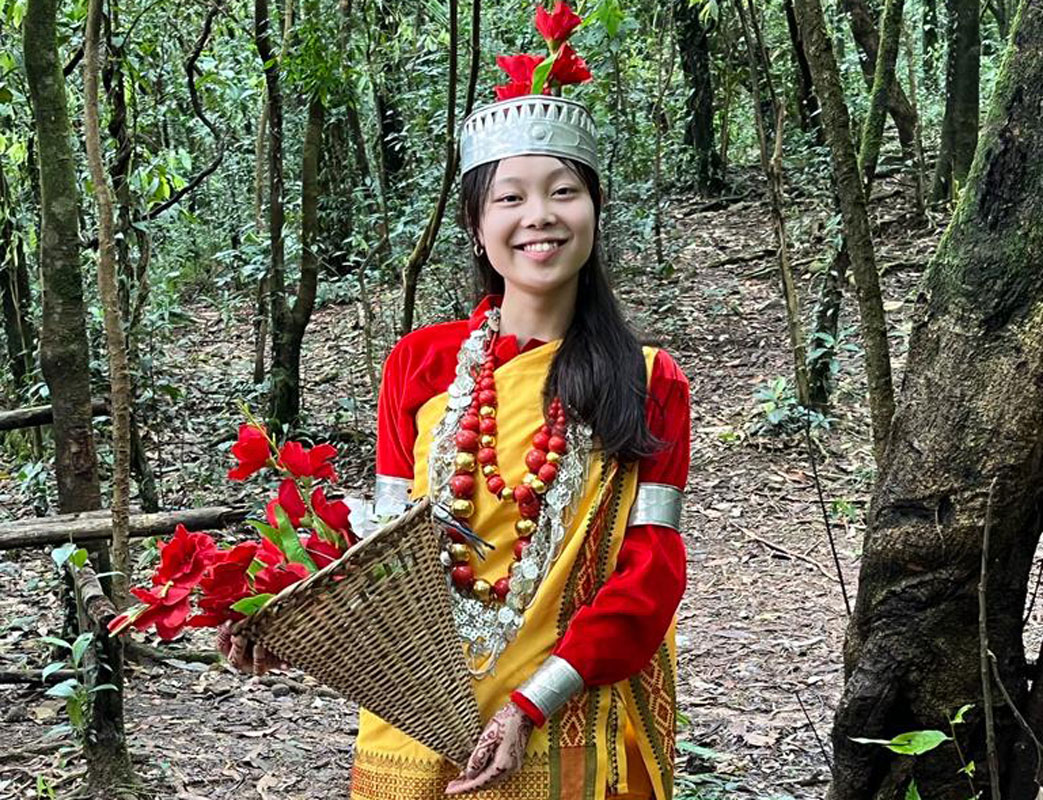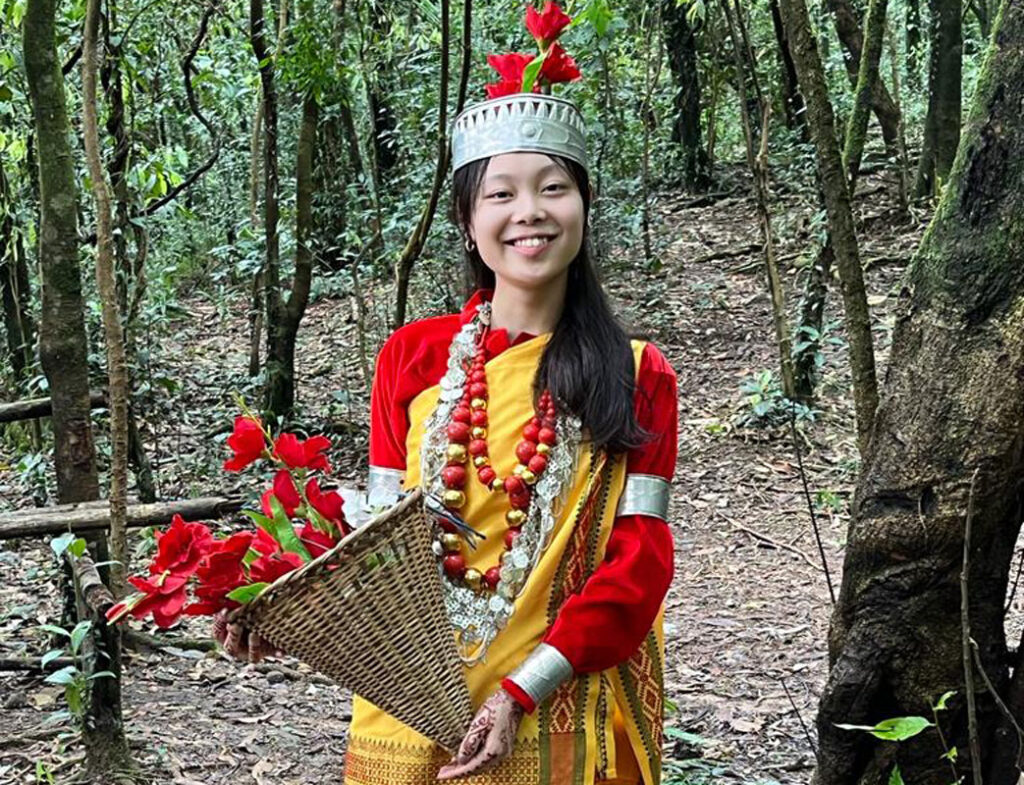When RI District 3131 was hosting a group of 12 youngsters from six different countries under Rotary’s Youth Exchange (RYE) programme, “they felt that these students should spend about 10 days in the Northeast, particularly Assam and Shillong, and get a taste and feel of our culture and lifestyle,” recalls Nilesh Agarwal, incoming governor of RID 3240.

Even as the RID 3131 youth programmes chair Shobha Nahar was trying to find a Rotary connection in RID 3240, Agarwal came to know that a group of foreign students were in Pune for a one-year youth exchange programme and were looking for a partner in his district. As a youth exchange chair of his district (3240), he immediately connected with Shobha and offered to partner with RID 3131 to bring over the students to Assam and Meghalaya and give them an exposure to the natural beauty and diversity of the Northeast.
The CM spent some time talking to the students. He showed a lot of interest in discussing football with the student from Brazil.
— Priyama Goswami, incoming district youth exchange chair, RID 3240
He set about making arrangements along with his incoming district YE chair Priyama Goswami and on Oct 4, when the team of 12 students, along with Shobha, landed at the Guwahati airport, DGE Agarwal was there to receive them along with Priyama, a member of RC Gauhati South, its president Rajesh Batra and AG Bibhuti Dutta.
RYE is an international student exchange programme for students. Since 1929, RI has been sending young people around the world to experience new cultures, and get a unique experience in becoming well-rounded adults and citizens of the world. Priyama, who also heads the women’s empowerment team in her 76-member club, where 60 per cent of the members are women, and is secretary-elect of her club, recalls that when DGE Agarwal called her about the opportunity to plan a 10-day programme for 12 students from Spain, Germany, Japan, Italy, France and Brazil, she was very excited. “We set about the task of taking them to places such as Kaziranga, Majuli island, Cherrapunji and Shillong, the capital of Meghalaya. They were also invited for the Durga pooja held in Guwahati and participated in the Dusserah celebrations at the Nehru stadium.”
As RI encourages the exchange students to be hosted by Rotarian families wherever feasible, the visiting students were hosted by Rotarian families from different Rotary clubs of Guwahati and Shillong, to learn about the culture and customs of the region. For these students attending the colourful Durga pooja/Dussehra festivals was a fascinating experience and they learnt all about this important Hindu festival, which is celebrated in the Northeast region with great enthusiasm, faith and fervour. The students participated in the pushpanjali ritual to offer flowers to the deities and then enjoyed the prasad which was served to them, says Shobha.
These students will now definitely have a better understanding of what Rotary is all about. Now it is up to the Rotarians in their respective countries to follow this up and motivate them to become Rotarians.
A highlight of their visit to Assam was their short meeting with the Assam chief minister Himanta Biswa Sarma in Guwahati. “Of course, getting an appointment with the chief minister was very difficult, but our incoming DG Agarwal managed it, and the CM did spend some time talking to the students. He wanted to know about their countries, and showed a lot of interest in discussing football with the student from Brazil,” says Priyama. “He was also keen to know from them their impressions of the Northeast region of India and what they thought about its people and culture.” The Rotarians explained to the CM the objectives of the RYE programme and also pinned the RYE badge on him. “The event was widely covered by the media and did a lot to boost Rotary’s public image,” adds Shobha.

Later, the students were also taken to the Raj Bhavan where they were hosted breakfast by the Assam Governor Jagdish Mukhi and the students interacted with him on the various cultural aspects of the Northeast.
But their most exciting trips were to Majuli, “the world’s largest river island which attracts tourists from all over the world, and is fondly called ‘Assam’s cultural capital’. Our visitors were thrilled to learn that Majuli is also a strong contender for a place in UNESCO’s World Heritage sites. Mostly inhabited by tribals, the culture of Majuli is unique. Rotary Club of Jorhat hosted lunch for the students enroute to Majuli,” said Priyama. RC Nagoan hosted them to their second meal in Majuli.
On this island the students were fascinated with the art of mask-making. “In the little time they had with the artists, they learnt the rudiments of making masks and bought a few to take home as memories,” says Priyama.
She adds that for these youngsters, in the age group 16–19, “it was their first interaction with the tribals; they loved the island, enjoyed the food, our traditional dance dramas, such as the Mahabharat and Ramayana, and tried to learn how to make the masks.”
She herself hosted two of the students and said it was a wonderful experience for her family. “They ate whatever we gave them happily. During the first few days I gave them our local breakfast, made with rice. Leo, who stayed with us, would come to the kitchens and showed a lot of interest in learning how to make some of these traditional dishes for breakfast. He was very inquisitive and eager to learn and asked so many questions. When vegetable vendors came, he would take so many pictures, ask questions about the vegetables, and watched with interest the bargaining which goes on,” smiled Priyama.

The Kaziranga National Park was another fascinating experience for them, and they were most impressed by “this park’s contribution in saving the Indian one-horned rhinoceros from the brink of extinction at the turn of the 20th century. They were delighted to visit a place which has the distinction of harbouring the single largest population of this species,” says Shobha. A safari ride here where they sighted one-horned rhinos, apart from other wildlife, was the high point of their visit to this beautiful park. They were fascinated by the beautiful cane products that are made locally and purchased quite a handful to carry back home.
In Meghalaya, at Shillong, a perfect holiday destination, the three Rotary clubs of Shillong jointly organised a cultural programme to welcome the foreign students. Here the young visitors participated in various cultural activities, dressed in colourful traditional costumes and performed folk dances with gusto.

A highlight of their visit to Meghalaya was a trip to Cherrapunji, famous for its pristine, untouched beauty, lush greenery, cascading waterfalls, trekking trails, fresh air, and the world-famous double decker living root bridges made from rubber trees. Also known as Sohra, this is a high-altitude town in Meghalaya, and is well-known for its heavy rainfall. Shobha adds that the RYE students loved watching the waterfalls in Meghalaya, visited the museum, local market and tasted the local food. “They wanted to know what ingredients were used for making the food!”
The students also visited the Tezpur University where they had an interactive session with the local students. Both Shobha and DGE Agarwal say that the RYE as a flagship programme of RI gives youngsters an amazing exposure to the outside world, an opportunity to know all about different regions and cultures. The visit of the RYE students to the Northeast caught the imagination of the media and “we got amazing coverage in so many newspapers,” says Agarwal.
The two YE chairs thanked their DGs Anil Parmar of RID 3131 and Kushanava Pabi, RID 3240, and PDGs Prabhat Kedia, Kalpana Khound, Debasish Das, Manas Chaudhuri, Sunil Saraf and several assistant governors and members from RCs Guwahati, Gauhati South, Guwahati West, Guwahati Luit, Guwahati Icon, Guwahati Metro, Guwahati Elite, Dispur, Guwahati Smart City, Guwahati City, Shillong, Shilong Heritage, Orchid City Shillong, Jorhat, Nagaon, Tezpur, Greater Tezpur, several Rotaract clubs and host families.
Summing up the visit of the students, Shobha adds that for the first three days in Guwahati all the visitors were hosted by Rotarians, and after that they were put up in a hotel.
“I deliberately chose the Dusserah festival period because in the Northeast this festival is celebrated differently from the rest of India. The youngsters enjoyed the incredible love, warmth and hospitality extended to them in both Assam and Meghalaya. They loved the place so much and have made so many friends that in the future they will come here directly… it is almost as though the region has become a second home to them.”
In her interaction with the students she has gathered that after their visit to the Northeast, as well as the stint in Pune, where they have come for a year, “they have realised that Indians are very loving and caring people. The Japanese girl Iraho Swai, from RI District 2790, has even picked up some Marathi words and learnt to sing a few Marathi songs.” Some others are also learning Marathi from a tutor specially hired for them.
So will these students join Rotary in the future, I ask Shobha. “Well, these students will now definitely have a better understanding of what Rotary is all about. Now it is up to the Rotarians in their respective countries to follow this up and motivate them to become Rotarians. We have certainly kindled their interest in Rotary.” Not only in Rotary but Indian food and culture as well. Vincent from Germany enjoyed paav bhaaji and paani puri so much, that he has decided to take the readymade mixes with him home to make a few batches there!










